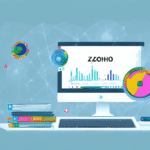Zoho Books vs NetSuite ERP: A Comprehensive Comparison
In today's competitive business environment, selecting the right financial management software is crucial for operational efficiency and growth. Zoho Books and NetSuite ERP are two leading solutions designed to streamline accounting processes, but they cater to different business sizes and needs. This in-depth comparison explores their pricing, features, usability, customization, and more to help you decide which system aligns best with your organization's requirements.
Overview of Zoho Books and NetSuite ERP
Zoho Books is a cloud-based accounting platform tailored for small to medium-sized businesses (SMBs). It offers essential features such as invoicing, expense tracking, project management, and inventory management, providing SMBs with the tools needed to manage their finances efficiently without extensive accounting expertise.
NetSuite ERP, on the other hand, is an enterprise-level software solution that delivers comprehensive financial management tools coupled with modules for customer relationship management (CRM), human resources (HR), supply chain management, and more. It's designed to support large organizations with complex operational needs and extensive customization requirements.
Pricing Comparison
Zoho Books is known for its affordability, with plans starting at $9 per user per month. It offers several pricing tiers to accommodate different business sizes and feature needs, making it accessible for startups and growing businesses.
In contrast, NetSuite ERP operates on a customized pricing model, where costs vary based on the number of users, chosen modules, and specific customization needs. According to NetSuite Pricing, prices can start around $999 per month, making it a more substantial investment, typically justified for larger enterprises with complex requirements.
Despite the higher cost, NetSuite ERP provides advanced functionalities that go beyond basic accounting, offering scalability and integration capabilities essential for large organizations. Zoho Books, while more budget-friendly, may lack some of the advanced features required by larger enterprises.
Features Offered
Both Zoho Books and NetSuite ERP deliver robust accounting capabilities, but they differ significantly in scope and depth:
- Zoho Books: Features include automated workflows, project management, inventory tracking, and seamless integration with other Zoho applications like Zoho CRM and Zoho Inventory.
- NetSuite ERP: Offers comprehensive modules including financial management, CRM, HR, supply chain management, advanced reporting, and extensive customization options to tailor the system to specific business processes.
For businesses requiring intricate financial and operational processes, NetSuite ERP stands out due to its depth and breadth of features. In contrast, Zoho Books is ideal for SMBs seeking essential accounting functionalities with the added benefit of affordability and ease of use.
Ease of Use
Zoho Books prides itself on a user-friendly interface designed for users with minimal accounting background. Its intuitive design includes automation features such as automatic bank feeds and recurring invoices, which enhance efficiency and reduce the likelihood of errors.
NetSuite ERP offers a more complex interface due to its extensive customization capabilities. While it provides a comprehensive set of tools for detailed financial and operational management, the learning curve is steeper, and users may require more training to navigate the system effectively.
Both platforms are cloud-based, allowing access from any location with an internet connection. Additionally, NetSuite ERP offers on-premises deployment options, providing greater flexibility for businesses with specific infrastructure requirements.
Customization Options
Zoho Books allows users to customize invoices, add custom fields, and modify workflows. The dashboard can be tailored by adding or removing widgets and rearranging its layout to suit individual preferences.
NetSuite ERP provides a higher level of customization, enabling the creation of custom modules, tailored workflows, and the addition of custom fields across various forms. Its dashboard customization is more advanced, allowing for the creation of custom Key Performance Indicators (KPIs) and charts, as well as embedding external content to provide a comprehensive overview of business metrics.
The robust customization capabilities of NetSuite ERP make it suitable for large organizations that require specific functionalities to align with their unique business processes.
Reporting Capabilities
Zoho Books offers a variety of standard reports, including financial statements, inventory reports, and project-based tracking. These reports help businesses monitor their financial health and operational performance effectively.
NetSuite ERP excels in its reporting capabilities, providing a comprehensive suite of customizable reports covering financials, operations, sales, and more. It features real-time dashboards that monitor key performance indicators (KPIs) and track business metrics, offering immediate insights into organizational performance.
Advanced reporting in NetSuite ERP supports data-driven decision-making, enabling businesses to analyze trends, forecast outcomes, and optimize operations based on real-time data.
Integration Options
Zoho Books seamlessly integrates with a multitude of third-party applications, including payment gateways, project management tools, and tax compliance solutions. Additionally, it integrates smoothly with other Zoho products like Zoho CRM and Zoho Inventory, enhancing functionality for businesses within the Zoho ecosystem.
NetSuite ERP supports integrations with a wide range of third-party software, including CRM systems, e-commerce platforms, marketing automation tools, and supply chain management solutions. These integrations help businesses streamline their operations and ensure data consistency across various functions.
Both platforms offer robust integration options, but NetSuite ERP's extensive compatibility makes it more suitable for large enterprises with diverse software ecosystems.
Mobile Accessibility
Zoho Books provides mobile applications for iOS and Android devices, enabling users to manage key accounting tasks on the go. The mobile app features an intuitive interface, allowing users to create invoices, track expenses, and monitor financial performance from their mobile devices.
NetSuite ERP also offers a mobile app that provides access to financial data, CRM functions, and project management tools. Its mobile application includes advanced features and customization options, catering to the needs of larger organizations with complex accounting and operational requirements.
Mobile accessibility in both platforms ensures that users can manage their finances effectively, regardless of their location.
Customer Support Options
Zoho Books offers customer support through chat, email, and phone during standard business hours. Additionally, it has a community forum where users can seek assistance and share solutions.
NetSuite ERP provides 24/7 customer support, including access to a help center, training materials, and dedicated support via phone or email. For larger businesses, NetSuite also offers implementation and customization support, as well as consulting services to help optimize software usage.
The comprehensive support options available with NetSuite ERP are particularly beneficial for large enterprises that require immediate assistance and tailored support services.
Pros and Cons
Zoho Books:
- Pros: Affordable pricing, user-friendly interface, seamless integration with Zoho suite, ideal for small to medium-sized businesses.
- Cons: Limited advanced features compared to full-fledged ERP systems, may not meet the needs of larger enterprises.
NetSuite ERP:
- Pros: Comprehensive feature set, highly customizable, scalable to accommodate growth, suitable for large enterprises.
- Cons: Higher cost, complexity in implementation and usage, potentially overkill for smaller businesses.
Which One is Better for Small Businesses?
Zoho Books is typically the preferred choice for small businesses due to its affordability and ease of use. Its straightforward accounting functionalities allow small business owners to manage their finances efficiently without the need for extensive accounting knowledge or significant financial investment.
Which One is Better for Larger Enterprises?
NetSuite ERP is better suited for larger enterprises with complex operational needs and the resources to invest in a comprehensive financial management system. Its extensive modules and customization capabilities support intricate business processes, making it a valuable tool for large organizations seeking to optimize their operations and drive growth.
Case Studies
Numerous companies have successfully implemented both Zoho Books and NetSuite ERP to enhance their financial operations:
- Zoho Books: Companies like Higher Logic and Sotech have effectively utilized Zoho Books to streamline their accounting processes and manage their financial operations with ease.
- NetSuite ERP: Enterprises such as Ultimate Software and Precept have leveraged NetSuite ERP to manage their complex financial and operational requirements, resulting in improved efficiency and scalability.
Expert Reviews and Opinions
Industry experts consistently praise Zoho Books for its affordability and user-friendly design, making it a top recommendation for small businesses and startups. Reviews on platforms like G2 highlight its ease of use and comprehensive feature set for its price point.
Conversely, NetSuite ERP is lauded for its comprehensive functionality and scalability, earning strong reviews in enterprise software evaluations by sources like Capterra and TechRadar. However, some experts caution about its higher cost and the complexity involved in implementation, which may be challenging for businesses without dedicated IT resources.
Future Trends in Accounting Software
The landscape of accounting software continues to evolve, with a growing emphasis on cloud-based solutions, artificial intelligence (AI), and machine learning (ML) integration. Both Zoho Books and NetSuite ERP are expected to advance in these areas, enhancing automation capabilities, improving predictive analytics, and offering more personalized user experiences. Additionally, integration with other business applications is likely to become more seamless, enabling businesses to maintain cohesive and efficient operational workflows.
Best Practices for Choosing the Right Accounting Software
When selecting an accounting software solution, it's essential to consider the following factors:
- Business Size and Growth: Assess whether the software can scale with your business as it grows.
- Budget Constraints: Determine your budget and compare it against the pricing models of the available software options.
- Industry-Specific Requirements: Ensure the software offers functionalities tailored to your industry needs.
- Desired Features and Functionality: Identify the essential features that your business requires and ensure the software provides them.
- Integration Capabilities: Check if the software can seamlessly integrate with your existing tools and systems.
Additionally, reading user reviews, consulting industry experts, and utilizing trial periods can provide valuable insights into each software's suitability for your business.
Conclusion: Which System is Right for You?
The decision between Zoho Books and NetSuite ERP ultimately hinges on your business's specific needs and circumstances. If you operate a small business or startup seeking an affordable, user-friendly solution with essential accounting features, Zoho Books is likely the optimal choice. Conversely, if you manage a large enterprise with complex financial and operational requirements and have the budget to invest in a comprehensive ERP system, NetSuite ERP offers the comprehensive tools necessary to support and enhance your business processes. By carefully evaluating your business needs, budgeting constraints, and desired features, you can select the software that best aligns with your organization's objectives and supports its growth trajectory.






















